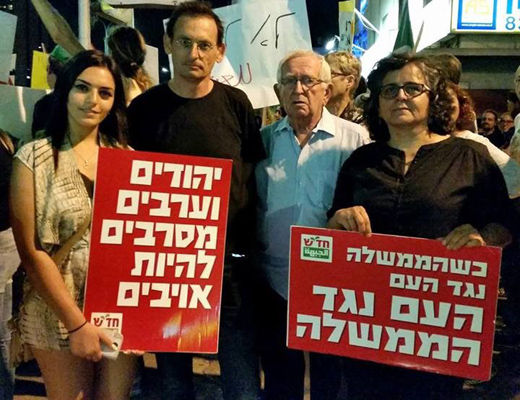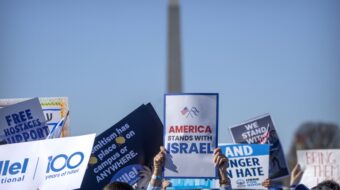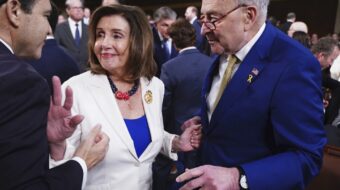
Hundreds of Israeli Jews visited the mourning family of Muhammad Abu Khdeir in Jerusalem on Tuesday to express condolences over the vicious killing of the Palestinian teenager last week. Muhammad, age 16, was burned to death in reprisal for the June killings of three Israeli youths hitchhiking in the Israeli-occupied Palestinian West Bank. Six Jewish teenagers have been arrested for Muhammad’s murder and some have reportedly confessed.
A rabbi from northern Israel who was among the group paying condolences called Muhammad’s murder “the desecration of God’s name.”
“I came to protest and declare that this is not the way my religion goes,” the rabbi told the Times of Israel. “I think we should say it out loud: This isn’t what we expect and what we want to happen. We’re looking for a different type of coexistence.”
The Abu Khdeir family thanked the visitors, noting that the family had not allowed Israeli government representatives to visit “because we felt their condolences were insincere.”
The visit was organized by Tag Meir, an Israeli interfaith coalition opposing Jewish anti-Arab racism and hate crimes.
Earlier, Muhammad’s father, Hussein Abu Khdeir, talked by telephone with Yishal Fraenkel, uncle of one of the three murdered Israeli teenagers, Naftali Fraenkel. The uncle told reporters that “the life of an Arab is equally precious to that of a Jew. Blood is blood, and murder is murder, whether that murder is Jewish or Arab.”
Several Palestinians from the Hebron area in the West Bank visited the Fraenkel family. One of the Palestinians said, “Things will only get better when we learn to cope with each other’s pain and stop getting angry at each other. Our task is to give strength to the family and also to take a step toward my nation’s liberation. We believe that the way to our liberation is through the hearts of Jews.”
On Saturday, some 300 Israelis demonstrated in Haifa, in northern Israel, under the theme “Jews and Arabs refuse to be enemies.” They included members of left Meretz party and the Israeli Communist Party – among them Knesset (Parliament) member Dov Khenin.
But right-wing Israeli Prime Minister Benjamin Netanyahu sent out a Twitter message calling for “vengeance” for the murders of the three Israeli youths.
And as a number of news media report, thousands of Israelis, including both soldiers and civilians, have joined rallies and social media campaigns calling for killing Palestinians in retaliation for the murders.
A Facebook page entitled “The People of Israel Demand Vengeance!” got more than 36,000 “likes” in just under two days before it was removed. Over 10,000 people joined an online campaign to kill a Palestinian “terrorist” every hour until the teens were returned to their families.
In April, the Palestinian news agency Ma’an notes, a Facebook page created to support an Israeli soldier who cocked his gun and aimed at Palestinian teenagers in Hebron received over 60,000 likes.
A scandal has erupted over charges, supported by video footage, that Palestinian American 15-year-old Tariq Abu Khdeir, a cousin of Muhammad Abu Khdeir who was visiting the family in Jerusalem, was savagely kicked and beaten by Israeli border police last week. Tariq lives in Tampa, Fla. The police claim he had been involved in anti-Israel actions. He and the family deny this. He has been released from jail and put under house arrest in Israel. His family is trying to get him released and returned home.
Meanwhile a confrontation between Israel and the Hamas leadership in Gaza has escalated sharply.
Israeli military officials said the Israeli air force carried out strikes on some 160 targets in the Gaza Strip over Tuesday night. Ma’an reported Wednesday that the Palestinian death toll from Israeli strikes on Gaza had reached 39. Among the latest victims Wednesday were a mother and two small children in the al-Maghazi refugee camp, with another two children reported missing.
Israel says its airstrikes were launched in retaliation for rockets fired from Gaza into Israel. The Israeli newspaper Haaretz reported that Palestinians in Gaza fired more than 85 rockets at Israel on Monday, “with Hamas openly claiming responsibility for some of the launches for the first time since the current escalation began.” The rockets hit several major cities in Israel’s south and, for the first time in the current fighting, caused alarms to go off in central Israel and Jerusalem. (The Jerusalem alerts were later reported to be false alarms.) The rockets lightly wounded two Israelis and caused property damage.
In turn, those rocket firings from Gaza followed a wave of Israeli airstrikes on the Gaza Strip over Sunday night, causing Palestinian fatalities for the first time since the current fighting began. Hamas’ armed wing said six of its members were killed in the strikes. Israeli armed forces denied this, claiming the six were killed in the collapse of a tunnel under the Gaza-Egypt border.
Inside and outside Israel, critics of Israel’s air campaign say military escalation will not solve the problem of rocket attacks from Gaza and will further inflame the situation. In addition, it puts Israel in the position of inflicting collective punishment on civilians, a violation of international law.
Israeli Prime Minister Benjamin Netanyahu and his right-wing coalition appear to be using the murders of the three Israeli teenagers to try to destroy the recently formed Palestinian unity government which includes Hamas. Formation of the unity government is widely seen as having the potential to help achieve a Palestinian-Israeli agreement. But that is something fiercely opposed by the Israeli far-right.
Photo: Knesset (Parliament) member Dov Khenin (second from left), a leader of the Israeli Communist Party, with other participants in a joint Jewish-Arab demonstration June 7 in Haifa, Israel, holds a sign reading “Jews and Arabs refuse to be enemies.” Communist Party of Israel/Al Ittihad

MOST POPULAR TODAY


Zionist organizations leading campaign to stop ceasefire resolutions in D.C. area

High Court essentially bans demonstrations, freedom of assembly in Deep South

Afghanistan’s socialist years: The promising future killed off by U.S. imperialism

Communist Karol Cariola elected president of Chile’s legislature






Comments